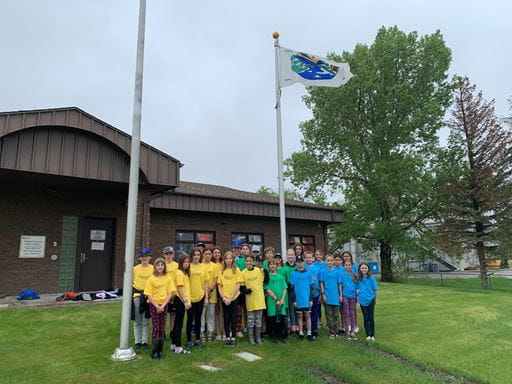Released on May 26, 2023
The Government of Saskatchewan has proclaimed May 21 to 27 as Treaties Recognition Week in the province. The Treaties in Saskatchewan are formal agreements between the Crown and First Nations with their expectations and obligations.
Treaties Recognition Week was first proposed by students in the Grade 5 Class at Ecole Lumsden Elementary and their teacher Justin Freitag. The students attended a Treaty 4 flag raising at the entrance of the Town of Lumsden and were inspired to develop their own collective initiative to honour the original spirit and intent of the Treaties. Through consultation, relationship building, discussions with classroom visitors, education and letter writing, Treaties Recognition Week was formed.
"We are all Treaty people, and we are all responsible for honouring Treaty rights and relationships," Minister Responsible for First Nations, Métis, and Northern Affairs Don McMorris said. "I would like to share my appreciation for the dedicated work of Justin Freitag's Grade 5 Class at Ecole Lumsden Elementary for introducing the Treaties Recognition Week initiative. Their collaboration with the Office of the Treaty Commissioner to create valuable educational resources demonstrates a commitment to fostering understanding and respect for the Treaty Relationship."

Treaties Recognition Week honours the importance of Treaties and promotes educational opportunities surrounding Treaty rights and relationships. Learning about the collective Treaty rights and responsibilities fosters greater understanding and promotes mindful relationships between Indigenous and non-Indigenous people. Treaties Recognition Week also represents one of many steps toward healing and reconciliation.
"Treaty education and information need to be widely available to the public, and Treaties Recognition Week is an important way to do this," Treaty Commissioner of Saskatchewan Mary Musqua-Culbertson said. "This week, the Office of the Treaty Commissioner is taking people through the journey from before the Treaty to now, including recognizing the broken Treaty promises, colonization, the long-term impact of residential schools, and the rest of the true history of Canada. This week is about acknowledging the harm of broken Treaties and the discrimination faced by Indigenous people, which we can no longer ignore. The week is also about working together towards reconciliation and building a better life for future generations."
"Our vision was that Treaties Recognition Week would help connect all the people of Saskatchewan. From border to border to border to border," Ecole Lumsden Elementary School teacher Justin Freitag said. "Treaties Recognition Week would bring attention to Treaty Education and support awareness between communities as they navigate the truths of our shared history. The spirit and intent of Treaties was to have people renew, build and maintain ethical relationships, and to learn from one another as we share this beautiful land in the province that we call home."
In 2008, Saskatchewan became the first province in Canada to ensure Treaty education became mandatory in all K-12 classrooms. The Treaty curriculum, which includes the Treaty resource kit, was created in collaboration with the Treaty Commissioner and provided to schools across Saskatchewan.
In 2022, the Government of Saskatchewan, in partnership with the Office of the Treaty Commissioner, worked in collaboration to make Saskatchewan the first jurisdiction in Canada to place official road signage marking treaty boundaries along major provincial highways. The first signs mark the Treaty 4 and Treaty 6 boundaries on Highway 11. Additional signage for Treaty boundaries located along the National Highway System in Saskatchewan is also earmarked for this year.
To learn more about Treaties, visit the Office of the Treaty Commissioner's webpage at http://www.otc.ca/.
-30-
For more information, contact:
Juliia DynnykGovernment Relations
Regina
Phone: 306-787-4340
Email: juliia.dynnyk@gov.sk.ca
